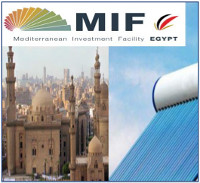 |
The agreement |

The Mediterranean Investment Facility Initiative, financed by the Italian Ministry for the Environment, is coordinated by UNEP in order to pave the way for sustainable conditions to mobilize private sector investments and stimulate a credit market for renewable energy technologies, by improving end users access to credit.
The aim of the project is to create a long-term sustainable framework through the development of a comprehensive implementation of innovative financial schemes and market stimulation tools for the deployment of the distributed renewable technologies.
Objectives and results |
The main components of the project are the following.
Support the design, implementation and monitoring of legislative ordinances: solar and reduction of building cooling needs
Development and implementation of the ordinance (a guideline that includes technical specification) on the reduction of the cooling need for new Distinctive and Medium houses.
This activity foresees:
a) stakeholder’s consultation (building constructors, real estate market operators, technology providers, designers);
b) information and awareness raising campaigns both to Egyptian and Italian entities;
c) training of building constructors and technicians (installers and planners);
d) development of suitable software for building simulation, to be used by the Ministry of Housing and NUCA experts, with the aim to check for the compliance with the ordinance;
e) monitoring of the impact and of the internal procedures of the ordinances in order to keep track of the main impact obtained (CO2 emission savings, fuel savings, jobs created) and spread them among the civil society and policy makers.
Design and implementation of demonstration project to comply with the cooling ordinance (a guideline that includes technical specification)
A pilot project will be focused on the reduction of the cooling needs to gain awareness and to showcase the effectiveness and commercial viability of the measures developed for the reduction of the cooling needs in building.
Supportive incentives mechanisms for the deployment of small-scale renewable energy technologies through the involvement of local banks
In Egypt, cooling demand is accelerating fast, fueled by rising population and a real estate sector growing at 15% per year. In 2014 electricity demand was 20% higher than supply triggering blackouts and large-scale power sector investment. This growth also has significant greenhouse gas emissions and water consumption associated with it.
Hence Energy Efficiency in buildings is a key priority for Egypt. On the policy side, Egypt has developed the national Building Energy Efficiency Codes (BEECs). The residential BEEC was introduced by a ministerial decree in 2005 and a commercial BEEC was established in 2009. The residential BEEC is expected to reduce electricity consumed for cooling new homes by 20% while improving levels of heat comfort in non air-conditioned homes. The enforcement of the building code is a real gap in the Egyptian Market.
To close this gap it has been agreed that the Financing support mechanism wil be developed to incentivize the adoption of the ordinances for the reduction of the cool needs
The activities to be developed will include:
a) mapping of the existing financing mechanisms for the buildings sectors and scoping study to identify the beneficiaries of the financing mechanism (real estate developers, households, ESCOS);
b) improved professional capacity and awareness in domestic banks in managing Energy Efficient loans portfolio and targeted end users;
c) awareness raising campaign designed (e.g., fact sheets, events, study tours, corporate commitments, etc.)
d) training session for cooling technology providers;
e) call for proposals will be issued and technical evaluation to select eligible suppliers to the financing mechanism.
|
Contacts Stefania Tomaselli Cristiano Piacente
|
Documentation - Memorandum of Understanding IMELS-UNEP (July 2016, EN) |



